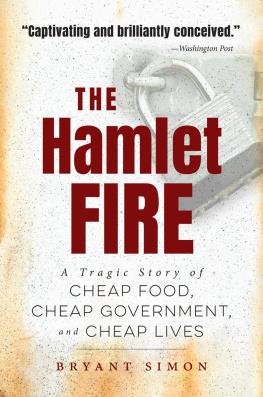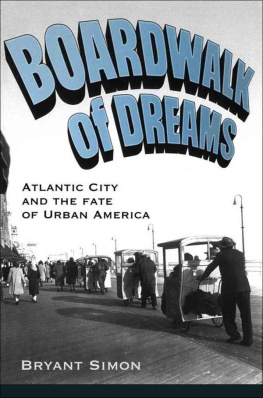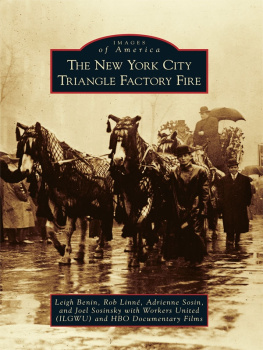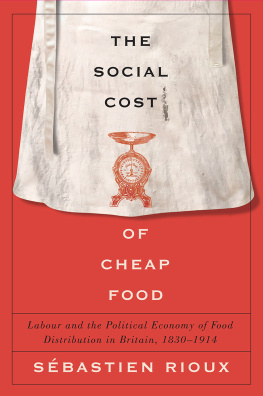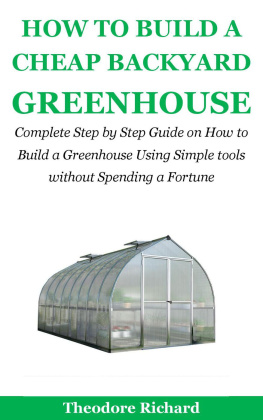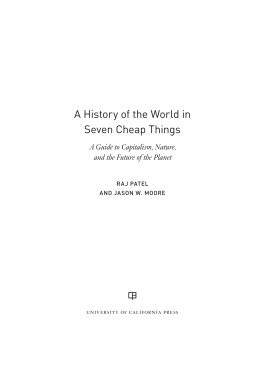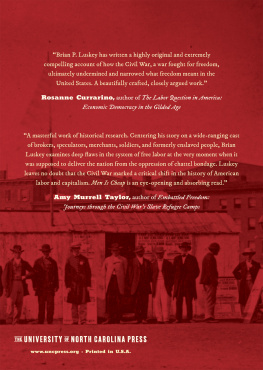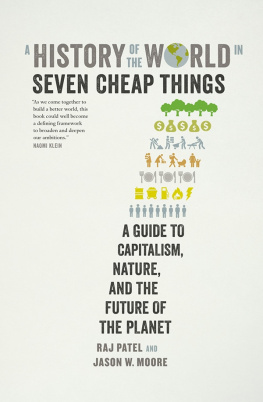PRAISE FOR THE HAMLET FIRE
Captivating and brilliantly conceived. It is testament to Simons reportorial instincts and research that he has found this sprawling, occasionally nauseating story in the detritus of that now-forgotten fire.Washington Post
A multidimensional volume [that connects] a fatal 1991 fire at a chicken processing plant in North Carolina to increasing consumer demand for cheap goods and cites disasters in other industries also driven by low prices. The Hamlet tragedy was not an isolated incident, Simon reminds readers, but part of a wider system of profit-driven labor exploitation.Publishers Weekly
A vivid, highly disturbing narrative with relevance to current discussions of economic inequality and workplace safety.Kirkus Reviews
This gripping and moving account of what happened and why goes far beyond what Morgan Spurlock attempts in his new documentary about the chicken industry.Hollywood Reporter
Engaging and humanizing. [Simon] uses the horrific event of a devastating accident at a chicken-processing plant in rural North Carolina to examine the consequences of the modern American convenience diet, where everything is expendable.Booklist
The Hamlet Fire provides a fresh approach to the crowded field of food history, encouraging us to consider the interconnections between consumer demand, the evolution of the American diet, and the hidden costs of deregulation.Journal of Social History
THE HAMLET FIRE
ALSO BY BRYANT SIMON
Everything but the Coffee:
Learning About America from Starbucks
Boardwalk of Dreams:
Atlantic City and the Fate of Urban America
THE HAMLET FIRE
A TRAGIC STORY OF CHEAP FOOD, CHEAP GOVERNMENT, AND CHEAP LIVES
Bryant Simon
The University of North Carolina Press Chapel Hill
Published by arrangement with The New Press, New York
This book was published with the assistance of the Z. Smith Reynolds Fund of the University of North Carolina Press.
2017 by Bryant Simon
ALL RIGHTS RESERVED.
Manufactured in the United States of America
Originally published by The New Press in 2017.
University of North Carolina Press edition published in 2020.
The University of North Carolina Press has been a member of the Green Press Initiative since 2003.
Cover illustrations: background iStockphoto/FrankvandenBergh; padlock iStockphoto/photosbyjim
ISBN 978-1-4696-6026-4 (pbk.: alk. paper)
ISBN 978-1-4696-6137-7 (ebook)
Library of Congress has catalogued the original edition of this book as follows:
Names: Simon, Bryant.
Title: The Hamlet Fire : a tragic story of cheap food, cheap government, and cheap lives / Bryant Simon.
Description: New York : The New Press, [2017] | Includes bibliographical references and index.
Identifiers: LCCN 2017014037 (print) | LCCN 2017022986 (ebook) | ISBN 9781620972397 (e-book) | ISBN 9781620972380 (hc : alk. paper)
Subjects: LCSH: Imperial Food Products. Plant (Hamlet, N.C.)Fire, 1991. | Poultry plantsFires and fire preventionNorth CarolinaHamlet. | Employers liabilityNorth CarolinaHamlet. | Industrial safetyGovernment policyUnited States.
Classification: LCC TH9449.H2 (ebook) | LCC TH9449.H2 S56 2017 (print) | DDC 363.11/9664930975634dc23 LC record available at https://lccn.loc.gov/2017014037
To my father, Robert Simon, and to his bright memory
CONTENTS
INTRODUCTION
A blessing and a cursethats how Loretta Goodwin described her job at Imperial Food Products.
She started processing chicken tenders at the rambling, one-story, red brick factory in Hamlet, North Carolina, on September 14, 1989, not long after celebrating her fortieth birthday. She didnt mind the job as much as some of her co-workers. Maybe thats because she knew what hard work was. One of sixteen, she had left school in the tenth grade to pick cotton, tobacco, and peaches to help her family get by. In her twenties, she had served up barbecue sandwiches and cleaned other peoples houses, done their laundry, and made their breakfasts and dinners. She was glad to be out of the hot sun and buggy fields, and she was glad to be out of white peoples kitchens and pantries. She was especially glad to leave the nursing home where she had worked for a dozen years before coming to Imperial.
Goodwin liked that she could weigh a five and half ounce chicken breast in her hand without using a scale. She liked that she could keep up with the speeding production line while others fell behind. What she didnt like about the job was the sour smell of chicken that clung to her long after her shift ended, or the ice-cold water that dripped off the meat and puddled on the floors, seeping into her shoes and then her socks. She didnt like how the ceaseless repetition of picking up and putting down frozen blocks of boneless chicken breasts made it feel like there was something inside her hands and fingers pinching at her flesh. She didnt like how the white supervisors hollered at her and sometimes made fun of her clothes and her weight. And she didnt like that she had to ask them to use the bathroom, or that they sometimes timed her trips to the toilet with a stopwatch and threatened to fire her if she went too often or for too long.
Still, Goodwin thanked God for the work. She made $5.50 an hour. That was $1.25 above the federal minimum wage at the time. On payday, she brought home a check for $179. As a single mother with five kids, three still living with her, and no regular child support from her former husband that she could depend on, Goodwin was glad, proud even, to be eking out a living in a place where a steady job at an hourly rate above minimum wage was as hard to find as a cool breeze in the summer or a street without a church on it. You couldnt get much else better around here, Goodwin reflected, assessing the labor market in the 1990s for black women like herselfand increasingly for white women and men across the color line as wellin her hometown and in so many other places across the country where good jobs had disappeared and unions had faded from the scene.
But Goodwins steady paycheck didnt change everything. After almost two years on the job, she remained one fall on the slippery floors, one sick child, or one missed shift because of her stiff hands away from sinking below the poverty line.
On Tuesday, September 3, 1991, the day after Labor Day, the buzzing of the alarm clock woke up Goodwin just before dawn. She didnt feel like getting out of bed that morning. Something made her feel uneasy about the day ahead. But she did what she always did. She shuffled around her rented house getting ready, avoiding the creaks in the floor so she wouldnt wake up her children. A little after 7:00 a.m., Ruby Sellers pulled up in front of the house in her puttering four-cylinder compact car. Goodwin didnt drive, so she got a ride to work from Sellers every morning. At the end of the week, she gave her gas money. They felt the thickness of late summer in the air as they rode through town under overcast skies, passing convenience stores, aging hotels in need of repairs, and the towns signature building, the Victorian-era train depot with its gables and intricate woodwork. After taking a left on Main Street, they made a right onto Bridges Street. They drove up the hill to the Imperial plant and parked a little beyond the factory in the gravel lot. As they walked inside, they didnt notice the tractor-trailer sitting at the loading dock or the driver, Rickie Godfrey, asleep at the wheel.

